
Image: Dominic Bayley / IDG
 At a glance
At a glance
Expert’s Rating
Pros
CPU and GPU upgrades provide year-on-year performance improvementsThe display is stunning and bright with a quick 240Hz refresh rateThe chassis build quality is very solid
Cons
The keys feel mushyThe speakers lack strong bassIt’s quite expensive
Our Verdict
The Razer Blade 14 is an excellent choice for those who want high framerates and stunning visuals in a gaming laptop they can take anywhere.
The Razer Blade 14 laptops I have reviewed in the past have always punched above their size showing performance akin to larger gaming laptops. The 2024 version is no different. While the laptop’s gorgeous QHD+ 240Hz display remains virtually the same as last year, upgrades to its CPU and GPU help bring about respectable performance boosts and a few AI benefits. Read on to find out more.
Looking for more options? Check out PCWorld’s roundup of the best gaming laptops available right now.
Razer Blade 14: Specifications
Razer’s smallest and most compact gaming laptop comes with an AMD Ryzen 9 8945HS CPU and a QHD+ (2560×1600) display with 1TB of SSD storage this year. On top of that, you can choose your GPU poison – either Nvidia’s powerful mid-range GeForce RTX 4070 GPU or the more entry-level RTX 4060 GPU.
Razer’s website also lets you select your color preference and your choice of RAM. For color, Black or Mercury are the two options available and they both look very stylish. Razer has canceled charging the $400 extra you had to pay last year for the Mercury option compared to the Black, which is welcome news. The Blade 14’s RAM comes in either 16GB or 32GB flavors but is upgradable to a whopping 96GB. My review unit’s specifications are as follows:
CPU: AMD Ryzen 9 8945HS
RAM: 32GB DDR5 / 5600MHz
GPU: Nvidia GeForce RTX 4070
Display: 14-inch, QHD+ (2560×1600) resolution, 240Hz refresh rate, 100 percent DCI-P3 color gamut, anti-glare with matte finish, AMD Free Sync Premium, Calman verified
Storage: 1TB PCIe Gen 4 SSD
Ports: 2 x USB-A 3.2 Gen 2, 2 x USB4 Type-C (with Power Delivery and Display Port 1.4), HDMI 2.1 port
Networking: Wi-Fi 7, Bluetooth 5.4
Webcam: 1080p Windows Hello IR camera
Weight: 4.05 pounds (1.84kg)
Dimensions: 0.70 x 8.97 x 12.23 inches
Battery capacity: 68.1 Watt-hour
Price: $2,699.99
Razer’s website shows a base price of $2,199.99 for a Blade 14 model with an RTX 4060 GPU and 16GB of RAM. But flipping the specs to the top-of-the-line model with an RTX 4070 GPU and 32GB of RAM and you’ll need to pay a cool $2,699.99. That last price tag is steeper than some 14-inch competitors with comparable specs.
For example, a 2024 Asus ROG Zephyrus G14 with the same AMD Ryzen 9 8945HS CPU and GeForce RTX 4070 GPU, currently costs just $2,199.99. To be fair, though, the Blade 14 is priced more competitively than last year. A price tag of $2,699.99 knocks $100 off the price off the top-line model I reviewed in 2023, so kudos to Razer for making that happen.
Razer Blade 14: Design and Build
Strong and stylish are the best adjectives for the 2024 Razer Blade 14’s chassis that demonstrates the same rigidity and premium look that Razer Blade laptops have become well known for. Razer’s vigorous manufacturing process is again why, it CNC-mills the laptop chassis from a solid block of aluminum.
Yet for all the aluminum it sports, the 2024 Razer Blade 14 is once again quite portable. It weighs just 4.05 pounds, which means you can hold it up with one hand and still carry your morning coffee in the other. Its pint-sized chassis measures 0.70 x 8.97 x 12.23, so just like its 2023 forebear, this newest model easily fits into a backpack or satchel. A useful mix of USBC4 and USB-A ports, a HDMI 2.1 port and 3.5mm audio jack means you can comfortably accommodate a standard list of gaming peripherals.
“It also features a fast 240Hz refresh rate. That last feature was like having an extravagant fifth gear for my games and videos in that I did notice a marked reduction in screen tearing and glitching.
Surprisingly, though, it doesn’t win the award for the smallest or lightest 14-inch gaming laptop in 2024. For me, at least from the laptops I’m currently reviewing, the 2024 Asus Zephyrus G14 takes the cake for portability. It weighs just 3.31 pounds and measures 0.63 of an inch thick.
Still, the Blade 14 is exceptionally well made. Looking around the chassis and Razer has left a premium imprint on just about everything. The hinge incorporates a solid metal bar that’s tuned so that you can lift the lid with just one finger. You can casually prop it up, but it’ll stay put exactly and won’t close with furious play.
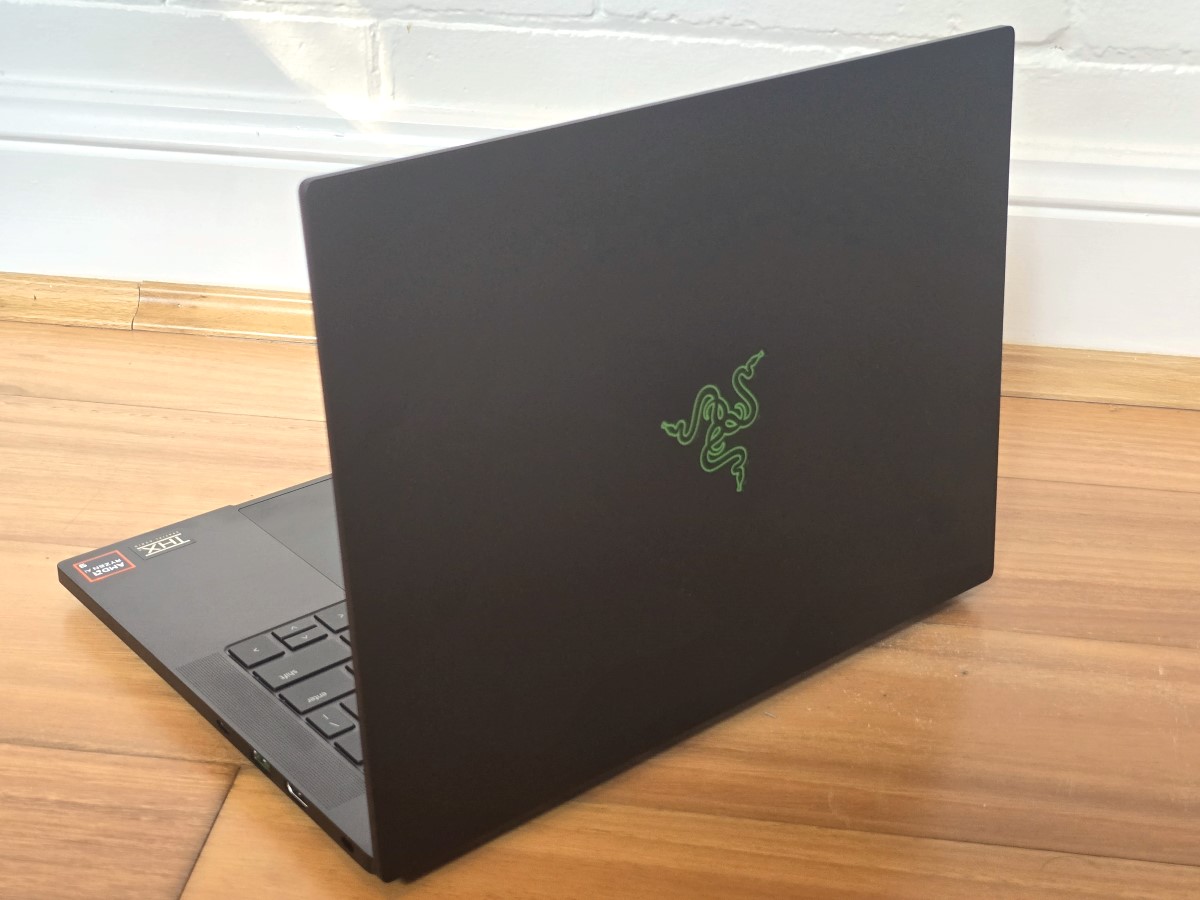
The Razer Blade 14 model in Black sports Razer’s iconic light up logo on the lid.
The Razer Blade 14 model in Black sports Razer’s iconic light up logo on the lid.
Dominic Bayley / IDG
The Razer Blade 14 model in Black sports Razer’s iconic light up logo on the lid.
Dominic Bayley / IDG
Dominic Bayley / IDG
Two other notable features impressed me. One is the laptop’s smooth matte anodized finish, which dulled my fingerprints to just invisible smudges. The other is the laser-cut upward facing speaker grilles that are quite discreet. Indeed, if laptops were made exactly to my preference, the 2024 Razer Blade 14 is exactly how I’d always want mine to look and feel.
Razer Blade 14: Keyboard and trackpad
Upon booting it up, the 2024 Razer Blade 14 lit up with a mesmerizing blue light display, thereby filling my mind with all the possibilities for per-key personalization on the Razer RGB Chroma keyboard.
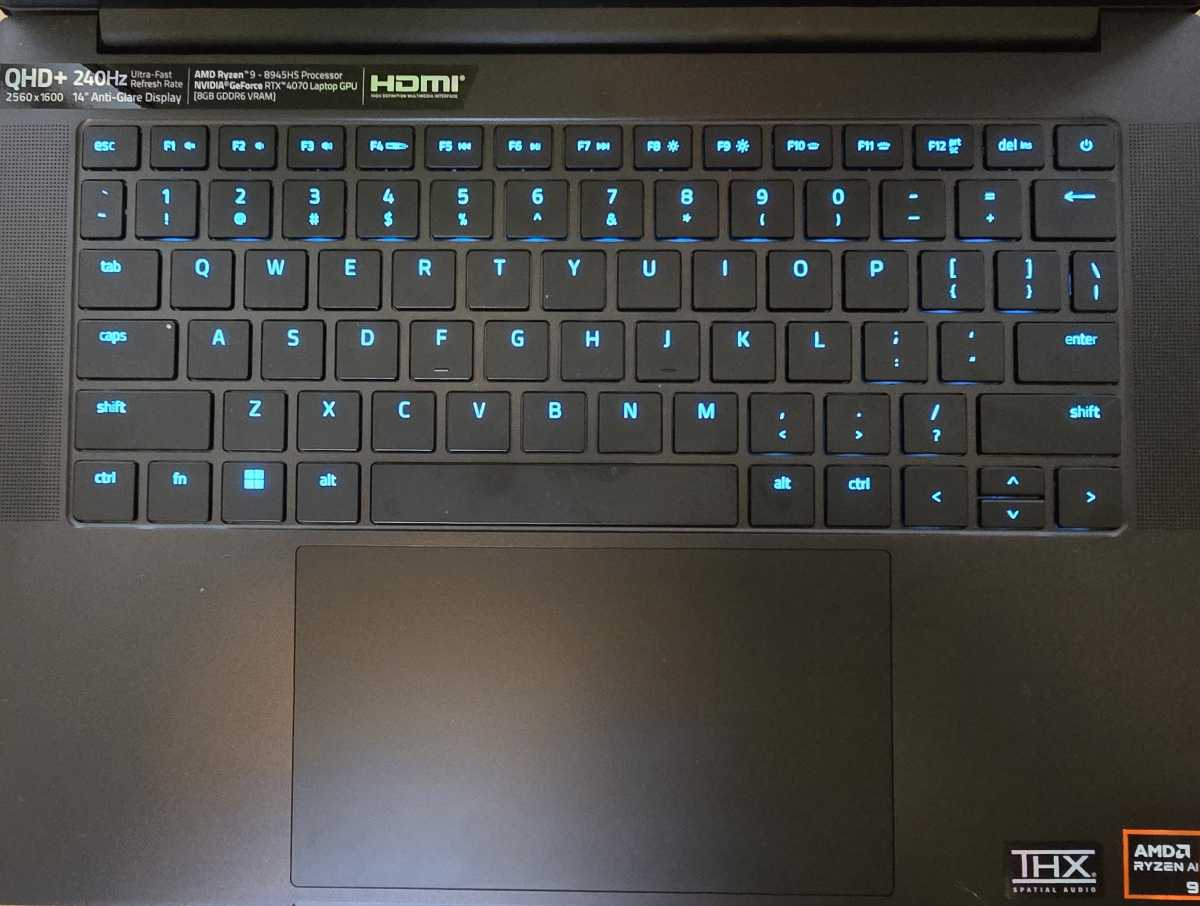
The Razer Blade 14 keyboard feels spacious despite the laptop’s small chassis.
The Razer Blade 14 keyboard feels spacious despite the laptop’s small chassis.
Dominic Bayley / IDG
The Razer Blade 14 keyboard feels spacious despite the laptop’s small chassis.
Dominic Bayley / IDG
Dominic Bayley / IDG
The keys have the same low profile and mushy feel as in the 2023 Razer Blade 14. As to the keyboard layout, it’s virtually identical to the 2023 Razer Blade 14. Space is at a premium, but Razer balances the key selection out well, so nothing feels cramped. You even get the luxury of left and right Shift and Control keys for your ancillary commands.
The Razer Blade’s Precision Glass trackpad feels ultra smooth to the touch but not too slippery. It let me slide my finger across it quickly but stop with pinpoint accuracy.
Razer Blade 14: Display and audio and webcam
The Razer Blade 14’s display is the same as in the 2023 model, which means it too is gorgeous and exceptionally smooth.
To refresh some of its best points, the QHD+ (2560x1600p) panel is framed up by ultra-thin bezels and in a tall 16:10 aspect ratio. It also features a fast 240Hz refresh rate. That last feature was like having an extravagant fifth gear for my games in that I did notice a marked reduction in screen tearing and glitching in games that I often have issues with like Elden Ring.
The colors in the DCI-P3 panel are also rich varied and the detail is incredibly crisp at 2560×1600. The panel is also very bright. I measured a peak brightness of 445 nits, which along with the display’s anti-glare coating allowed for decent visibility near sunlit windows.
The Razer Blade 14’s stereo speakers produce clear and bright mid-range and treble frequency audio. Sound is also projected well from the upward facing speakers. Although, it should be said, the laptop’s bass isn’t anything to phone home about. But that’s to be expected in such a small laptop.
I was also pleased with the laptop’s 1080p webcam, which produced clear images with natural-looking light in meetings.
Razer Blade 14: Gaming performance
AMD’s Ryzen 9 8945HS replaces last year’s Ryzen 9 7940HS CPU in the Blade 14. This new CPU, which also belongs to AMD’s Ryzen 9 series, utilizes AMD’s Hawk Point architecture. It features eight Zen four cores and 16 threads.
Speed-wise, this CPU operates from a base frequency of 4GHz up to a lightning quick maximum turbo frequency of 5.2GHz. The chip integrates second generation Ryzen AI technology in the form of an integrated NPU, which could be a big drawcard for creators looking to harness more AI generative power in apps like DaVinci Resolve. It also enables Windows Studio Effects on the laptop, such as background blurring and webcam automatic framing.
Here, though, I was more interested in finding out how well the CPU would stand up for triple-A gaming, for which I ran a bunch of benchmarks.
Laptops in my comparisons were gaming laptops sporting similarly powerful CPUs. The comparison field included the 2023 Razer Blade 14, which makes a useful point of reference for year-on-year performance improvements.
In Maxon’s Cinebench Multi-Threaded benchmark, which fires all the cores of the laptop’s CPU, the Razer Blade 14 turned in a score of 6,878. While some larger more powerful laptops outclassed the Razer Blade 14 in this test, its score still infers solid performance in CPU-intensive tasks like encoding or triple-A gaming.
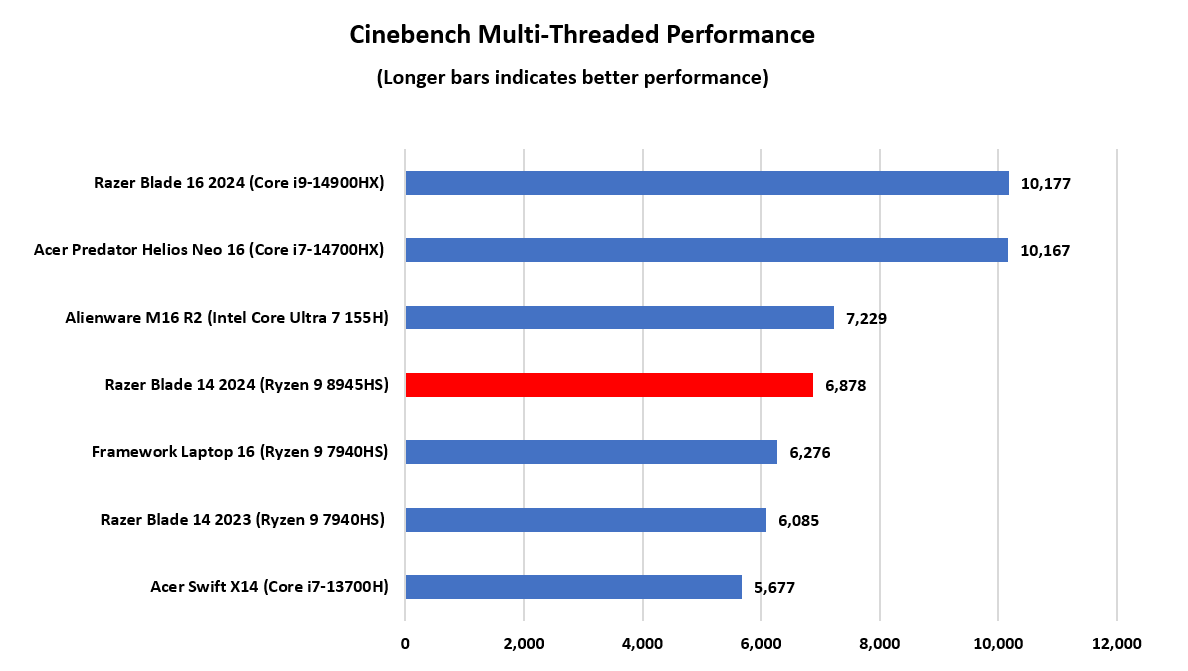
Dominic Bayley / IDG
Dominic Bayley / IDG
Dominic Bayley / IDG
The HandBrake test tasks the laptop to encode a 30GB MKV file to an MP4 using the Android Tablet preset, with a shorter duration to finish considered a better result. Here, the Razer Blade 14 finished in 884 seconds. Again, that’s a middle of the field result, but it’s an improvement over the 2023 model’s HandBrake result.
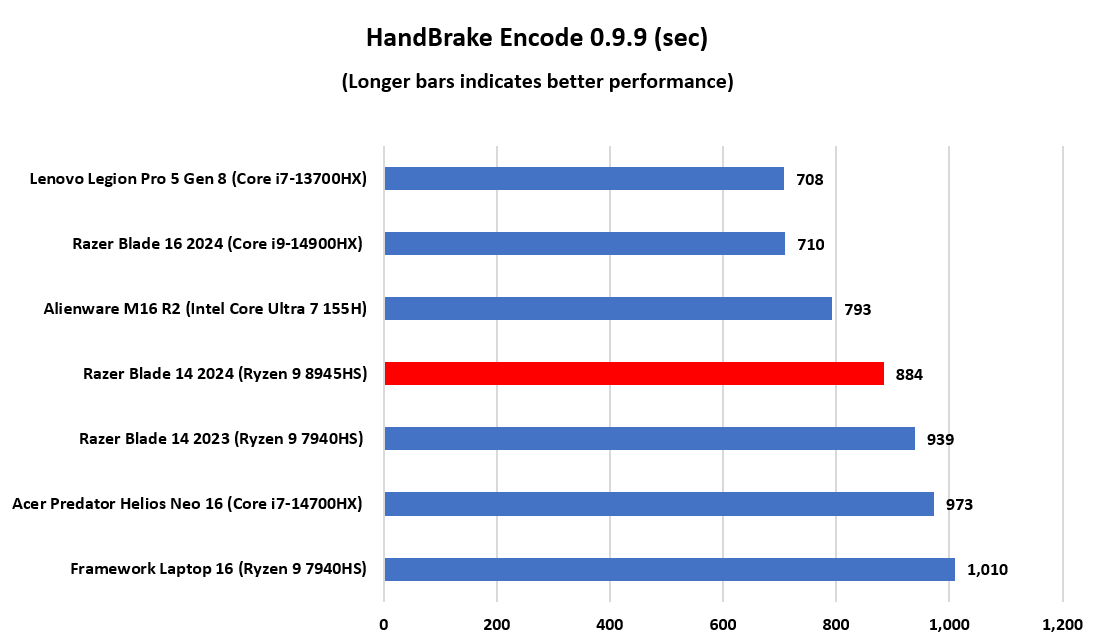
Dominic Bayley / IDG
Dominic Bayley / IDG
Dominic Bayley / IDG
Now on to the graphical benchmark. When I ran the 3DMark Time Spy 1.2 benchmark, the Razer Blade 14 punched well above its chassis size to place third in our performance chart. This result proves its RTX 4070 is extremely adept at 3D graphical tasks like 3D rendering for gaming – even when pitted against RTX 40 Series GPUs in larger laptops like the Razer Blade 16.
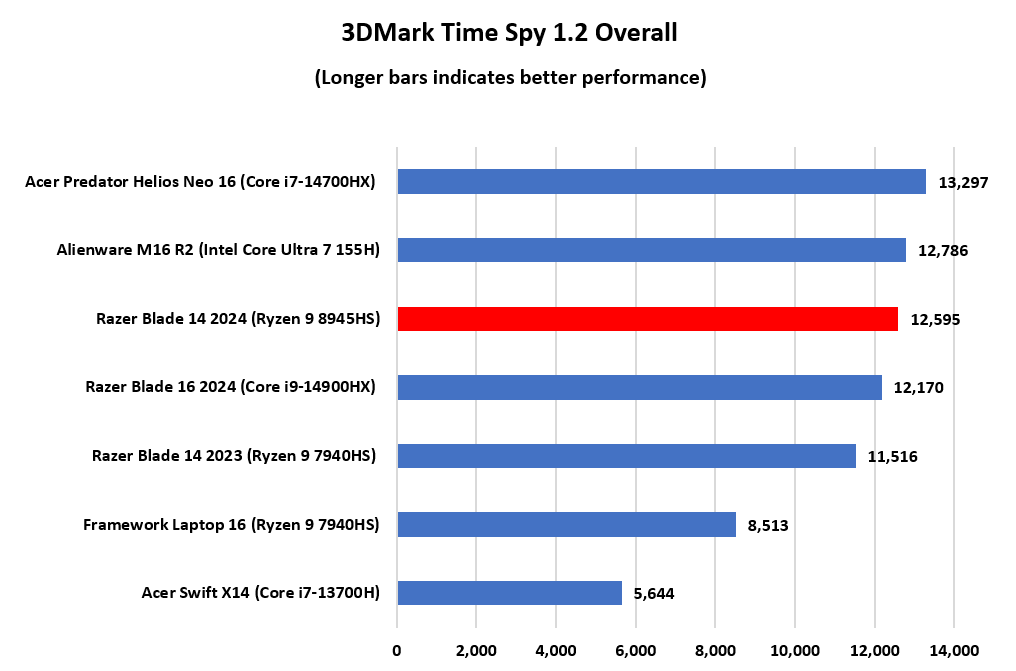
Razer Blade 14
Razer Blade 14
Razer Blade 14
Finally, in both of the gaming benchmarks the Razer Blade 14 impressed me with its high frame per second output.
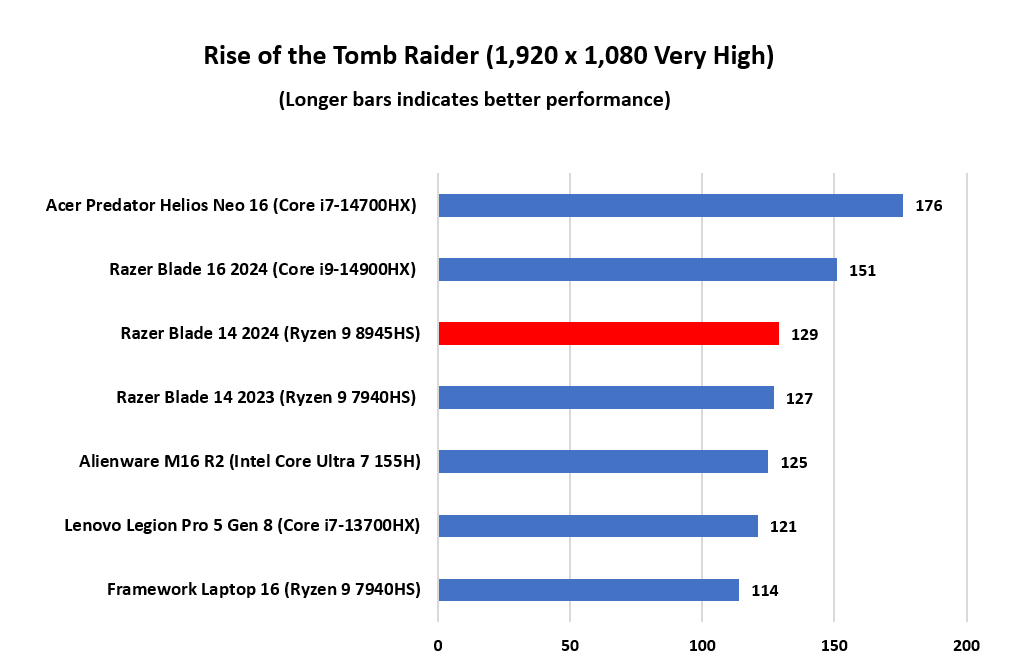
Dominic Bayley / IDG
Dominic Bayley / IDG
Dominic Bayley / IDG
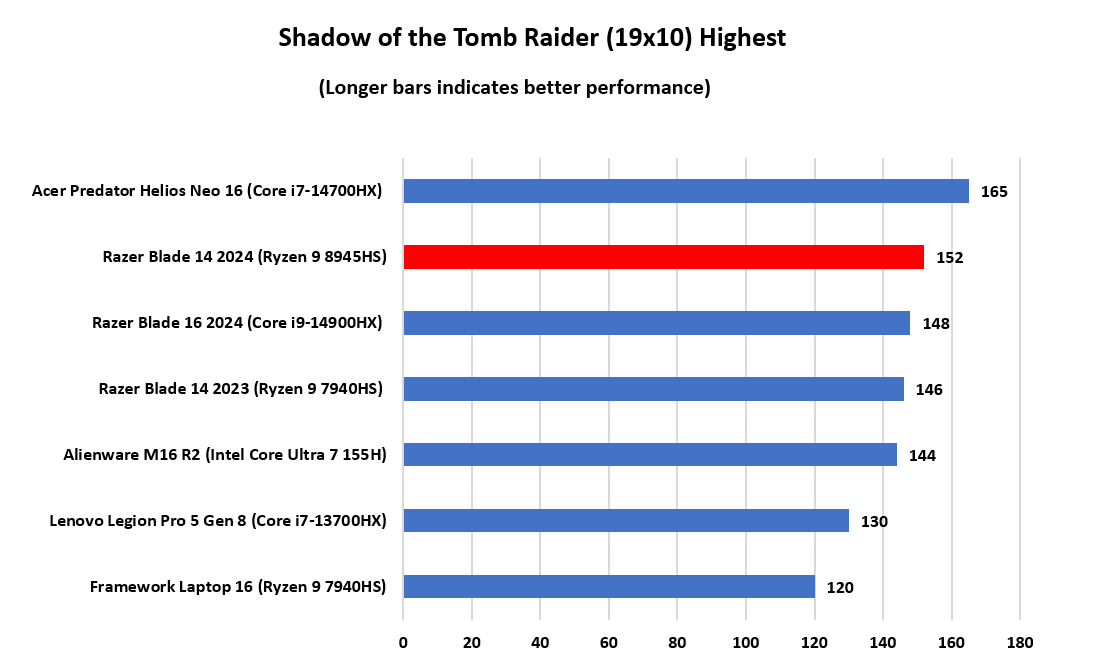
Dominic Bayley / IDG
Dominic Bayley / IDG
Dominic Bayley / IDG
To be sure, this bides well for hitting framerates above 120 fps in the latest games; the Razer Blade 14 will do that comfortably.
Razer Blade 14: Battery performance
To test the battery life, I charged the laptop’s 68.1 watt-hour battery to full capacity. The sound was switched to 50 percent and a cheap pair of headphones plugged in reduce noise. I also switched the laptop to airplane mode and turned off the keyboard lighting. Lastly, I set a 4K Hollywood movie to repeat and timed how long the laptop took to go into standby mode.
The Razer Blade 14 lasted 595 minutes (nine hours and 55 minutes), which is a very fine result for a gaming laptop. It’s worth noting, however, that our PCWorld battery test is not particularly a quick power drainer. In a real-life gaming scenario, you could expect about half that battery life (approximately four and a half hours), so you’ll still want to keep the Razer Blade 14’s adapter handy if you intend to play uninterrupted all day long.
Razer Blade 14: Should you buy it?
Although it’s expensive, the Razer Blade 14 2024 has commendable performance and gorgeous fluid visuals for its size. For me, that’s what makes the Razer Blade 14 such a great option – I essentially see everything I would want in a laptop here. A solid robust frame, great performance, and amazing visuals and all in a compact portable unit. If you can afford one and are tempted, you should absolutely take the plunge.
>>> Read full article>>>
Copyright for syndicated content belongs to the linked Source : PCWorld – https://www.pcworld.com/article/2265434/razer-blade-14-review.html










